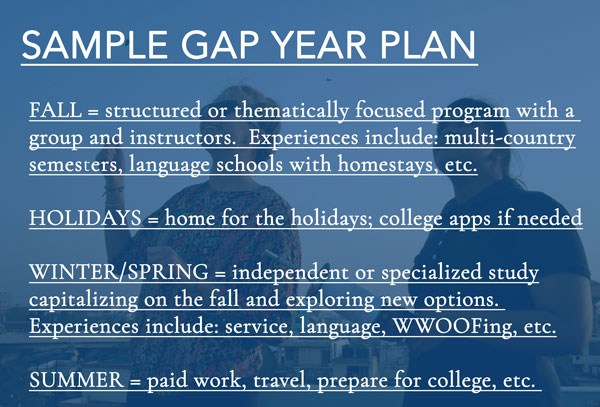How to Advise a Gapper
As the concept of pre-university gap years takes off across the world, educators and counselors are being called upon to help potential gap year students (commonly called “gappers”) to plan their journey. While this may at first seem like an overwhelming task, there is a wealth of resources available to anyone preparing to take a gap year. To successfully mentor a gap year student, be comfortable with your limitations, and learn your resources.
While the Gap Year Association is dedicated to increasing the number of gap year students, we understand that gap years may not be right for every student in every situation, and thus stand behind the most cardinal of advising principles in gap years: the student must make the choice - and thus take the ownership for - embarking on their gap year. As the most respected and longest running gap year consultant Holly Bull from the Center for Interim Programs has said, "this is perhaps the most important ingredient in a successful gap year."

Who Makes a Good Gap Year Candidate?
In most cases, a gap year candidate fits into a few specific categories: some are tired of running the same academic tracks, thus feeling ‘burnt out.’ In this typical case, students might be fairly high achieving academically, but perhaps want some time to revitalize and seek passions that lay off-the-track rather than within its four walls. In other cases, an ideal candidate, is one who simply doesn't know for sure what they want to be doing with their life and fear that the average $39,800 per year [http://nces.ed.gov] in tuition costs won't be well spent until they do. Thus, taking a gap year is about clarifying their own goals before university, and potentially learning that a university degree is not necessary to pursue their chosen career. In other cases, students will simply consider a gap year because they either didn't get into the university they were hoping to, or, because they were granted a spring acceptance and now have a semester of time they want to do something productive with.
In every case though, a student taking a gap years is one whom will require some support as they'll necessarily be breaking barriers set by peers, their parents in some degree, and hopefully their own comfort zones.
Best Practices in Working with a Gapper
Being an educator who relates to gap years, whether as an Independent Educational Counselor, an Admissions Counselor for a college or university, or being a high school educational or college counselor, there's much to know about gap years. In general, the best practice still remains simply to encourage your student to apply to college, get accepted and pay their deposit, then ask for a deferral to do their gap year.
Takeaways:
- Let the student lead the way. This is their experience, and the "natural consequences" of their choices are fundamental to real world learning
- Start with a list of exciting ideas - browse the Accredited Programs List and just write down 15-20 exciting themes. Those themes turn into a great outline for a fantastic gap year
- Students should keep a journal while on their gap year!
- Most students are acceptable gap year candidates. A gap year stands to benefit anyone who takes one ... although they might not be right for everyone
- The majority of Gap Year students require some level of support, but it varies from student to student what levels of support they need
- Work with your family to identify core priorities, career explorations, learning outcomes, hobbies - making this "intentional" is key
- Start with more structure and work your way into less, this puts heavier costs up front and can save money
- Volunteering is COMPLICATED. At the GYA we use the Fair Trade Learning Standards as our test for ethical volunteering
- Find the RIGHT expert. You might not need a Professional Gap Year Consultant, but make sure you know the essentials, especially if you're traveling to the developing world
- Make sure you consider any medications, and allow for contingencies - if something goes wrong at school there it is a lot different than by yourself in the Sahara
